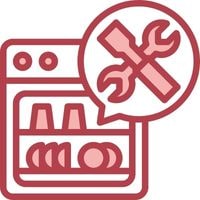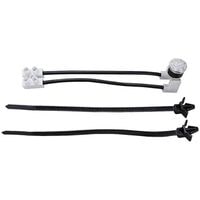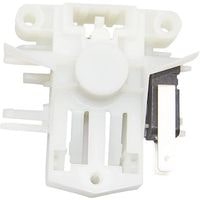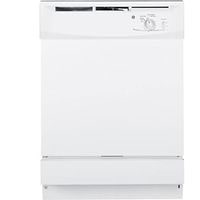Ge Dishwasher Won’t Start. Make sure you troubleshoot your dishwasher before calling a professional if it won’t start.
Hiring a technician requires a lot of money, and you won’t know what the problem is until things take longer than expected to get solved.
This guide will help you determine if your dishwasher has stopped functioning due to an emergency or something that can be fixed easily without seeking additional assistance.
You’ll learn how to troubleshoot major parts of a dishwasher as well as recognize when this job calls for more than what you are able to perform on your own.
Ge Dishwasher Won’t Start
If the dishwasher doesn’t start, make sure that the device is properly plugged into a functional outlet with power. Confirm switch is on and functioning accordingly.
Switches are often found in locations such as under sinks or near dishwashers themselves.
Ensure your home’s circuit breaker panel or fuse box does not have any tripped breakers or blown fuses that would interfere with the dishwasher’s operation and/or electrical supply.
Start Switch Issue
A dishwasher’s Start button is one of the most commonly used keypad buttons.
Pressing this button while your door latch and power are in good working order can indicate an issue with the main control panel, which will require a technician to fix.
If you have a multimeter, you may be able to test the Start switch yourself to see if it’s faulty, but if not you will need an appliance repair technician to perform a diagnostic test on it. Once you know where the fault lies, they can easily replace the switch if necessary.
Defcetetive Thermal Fuse
A thermal fuse helps remove extra heat from the control board. If the thermal fuse is defective and blows out, electricity will no longer reach the control board.
The fuse serves to prevent extreme levels of heat that could overheat circuit boards and burn through wires if another component should fail.
In just such a case, a ruptured thermal fuse can also prevent water from flowing into other electrical components as well.
If this part stops functioning normally, then it’s important that a new one be installed in its place as soon as possible. This will help eliminate potential fire hazards.
Motor Start Relay Problem
If your dishwasher doesn’t turn on, verify that it is receiving power by flipping the circuit breakers off and on. Once this is verified, locate the motor start relay next to the motor itself.
Use a multimeter and test the continuity of both ends. The coil connecting portion should show continuity at all times, signifying that electricity is running through it and allowing your dishwasher to run.
The switch side should only show continuity when activated, making sure there is both an “on” and an “off” for your dishwasher.
Misbehaving Touchpad
When troubleshooting an unresponsive touchpad, it’s a good idea to test that the problem is with the touchpad itself.
If you are having issues with tapping on the pad and nothing happens or tapping in the wrong place, you can try pressing various buttons on the touchpad.
If some of those buttons don’t respond when you press them, it’s a pretty safe bet that your touchpad might be defective.
If none of the tests yields results or if your hardware isn’t sold separately, replace both at once: buy a new control panel (i.e., motherboard) as well as a new touchpad!
Switching Door Issues
Dishwashers typically have a switch that prevents the unit from running unless the door is closed.
If this door switch malfunctions, it won’t send the ‘run’ signal to depressurize the system and allow water to flow freely throughout the spray arms.
When one of these switches fails, it doesn’t always break permanently but rather produces intermittent faults.
To fix these types of problems, use a multimeter (or digital circuit tester) when testing for connectivity in order to determine if a switch needs to be replaced or not.
Defective Drive Motor
The dishwasher’s motor is one of the most crucial components. It powers the water sprayer and can make or break whether your dishes get clean or not.
If something goes wrong with this machine, it could end up a beautiful piece of technology lying on its side in the corner, never to be used again, a monstrosity that you fear to show your guests lest they ask how much of a handyman you are.
However, if the noise coming from your dishwasher seems problematic but isn’t so bad as to render it completely useless, your machine may well have a faulty motor.
Fault In Control Panel
Sometimes there are problems with the computer control panels on dishwashers. Malfunctions can often occur due to everyday usage and old age.
If you notice that your dishwasher is having other issues, such as it randomly jumping from setting to setting at random or lights coming on by themselves, then it could be that the control panel needs replacement.
It’s best to contact a repair technician for your dishwasher if you think it needs new parts.
Examine The Power Plug
Most of the time, your dishwasher’s power supply is located behind cabinets beneath a sink, or in some cases, it might even be further down a disused hallway.
Before you do anything else, it’s best to double-check that the power Plug is secured firmly inside the outlet and if you can reach it venture down into your electricity box, where you will find your breaker box.
Check that the breaker supplying power to your dishwasher isn’t flipped off and that there aren’t any frayed or damaged parts on the cord itself.
If you flip the breaker back on and, this time, check that lights are coming on in your dishwasher – then this should resolve any issues you may have been experiencing.
Ge Dishwasher Won’t Start
Related Guides
